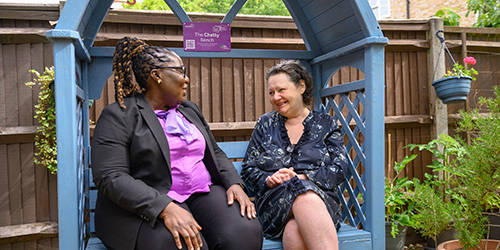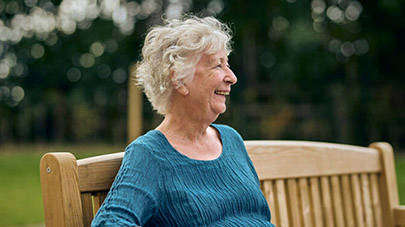- Home
- Guides & support
- Dietary recommendations for people with dementia
Last updated 31 January 2025
Dietary recommendations for people with dementia
Some people with dementia may have a poor appetite or lose interest in food altogether.
 Everything from the way you set up a table, to the colour of the tablecloth or the type of crockery used, can help encourage a person to feel comfortable and confident at mealtimes. We’ll explore the changes that can be made to a dining room to encourage people living with dementia to enjoy mealtimes again.
Everything from the way you set up a table, to the colour of the tablecloth or the type of crockery used, can help encourage a person to feel comfortable and confident at mealtimes. We’ll explore the changes that can be made to a dining room to encourage people living with dementia to enjoy mealtimes again.
Challenges with eating and dementia
There are a number of reasons why eating can become a challenge for individuals living with dementia. Firstly there are physical challenges that can make utensils difficult to use, such as tremors or issues with coordination. People with dementia may also struggle to remember if they’ve already eaten or become frustrated if the dining environment is unfamiliar or overstimulating. Some steps can be taken to improve this are discussed below.
Consider your cutlery
Sometimes people with dementia may find it difficult to use cutlery or crockery, so it can be helpful to provide smaller knives and forks and use high rimmed plates to ensure their dignity is maintained. In our care homes we also offer finger food to encourage independence and enjoyment at mealtimes.
Adapting dining environments
Playing a person’s favourite music can also help people to relax and enjoy the dining experience.
In care homes, carers build relationships with the families of residents to understand their eating habits and food preferences. With this information, we can ensure that they are eating healthily and consuming foods they enjoy as well as making sure the best overall care is being provided.
Mealtimes at Anchor
At Anchor we decorate our dining areas in colours that are warm and inviting, to stimulate appetite and encourage eating at mealtimes. We appreciate that not everyone likes company and ensure individual wishes are respected when it comes to mealtimes.
The smell of freshly baked bread, sponge cakes and coffee in a dining room can also stimulate appetite. We do all we can to make sure people are included in menu planning and offered choice at every meal.
Find out more about catering in our care homes.
What diet is recommended for people living with dementia?
 In general, it is best to ensure people get the nutrients they need through a balanced diet. Including a variety of foods from different food groups will ensure they receive the vitamins, minerals, and fibre they need.
In general, it is best to ensure people get the nutrients they need through a balanced diet. Including a variety of foods from different food groups will ensure they receive the vitamins, minerals, and fibre they need.
The Alzheimer’s Society recommends following a Mediterranean diet since it is high in antioxidants from fruits and vegetables. This diet contains oily fish, dairy, fruit, vegetables, and wholegrains and suggests a low intake of meat, sugar, and saturated fat.
Scientists developed the Mediterranean-DASH diet Intervention for Neurodegenerative Delay (MIND), which is a diet based on components of the Mediterranean and DASH diets. In their study, individuals ate natural plant-based foods and limited their intake of animal and high saturated-fat foods. They found that participants who stuck to the diet had a slower decline in cognitive abilities.
Dementia care with Anchor
By taking proactive steps, we can encourage people with dementia to enjoy mealtimes and ensure they are well-fed. Adapting living environments like considering what cutlery there is, playing their favourite music, and decorating the dining room can greatly improve meal experiences. At Anchor, our care homes understand the importance of these strategies. Our staff are trained to create a positive mealtime experience that caters to each resident's individual needs and preferences. Learn more about our dementia care.
Related information about dementia
This website uses cookies which track activity so that you get the best possible experience. By continuing to use this website we will assume you are happy and cookies will be set. You can change your cookie settings at any time.












